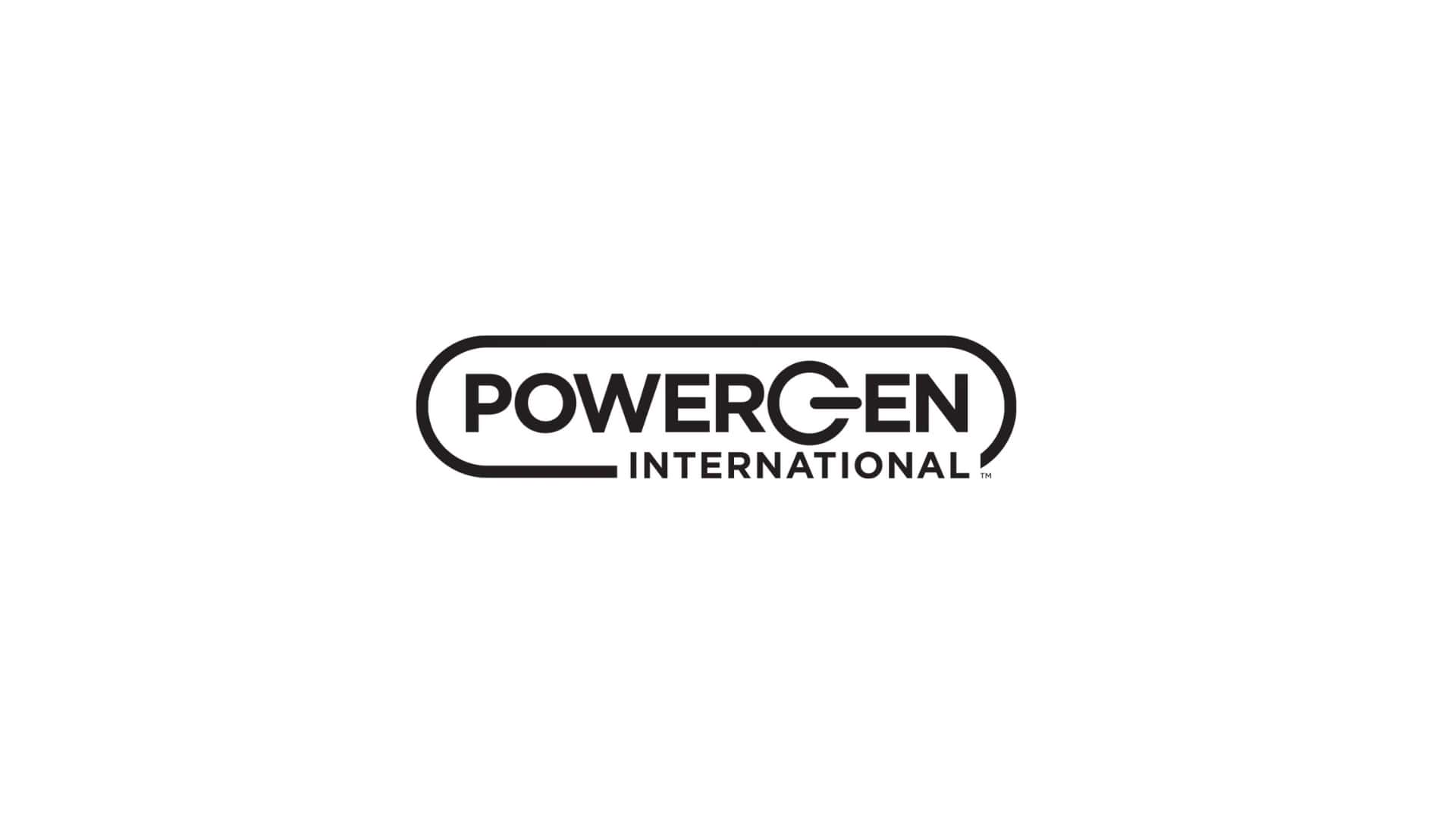Traditionally it has been common practice to complete oil changes at regular intervals as per the engine manufacturer's advice. But what if you want to take a more environmental and sustainable approach? That's possible too! The benefits of extending these intervals can be huge for the machinery, operator, and the environment! Machinery can be more efficient and more productive, but with a reduced maintenance budget by increasing filtration and testing. Environmental responsibility is increasing pressure in industrial processes, and simply adopting a few simple steps into your lubrication program could help you gain the lead against your competitors. With ever-increasing fuel and oil prices, organizations in the future will be as green and efficient as possible, and those who fail to adapt will struggle to grow successfully in business.
With efficient filtration technology, alongside regular testing and oil analysis, oil change intervals can be doubled or even tripled! By reducing your organization's total oil consumption, you can create big savings and help protect the planet from unnecessary waste with current filtration solutions available.
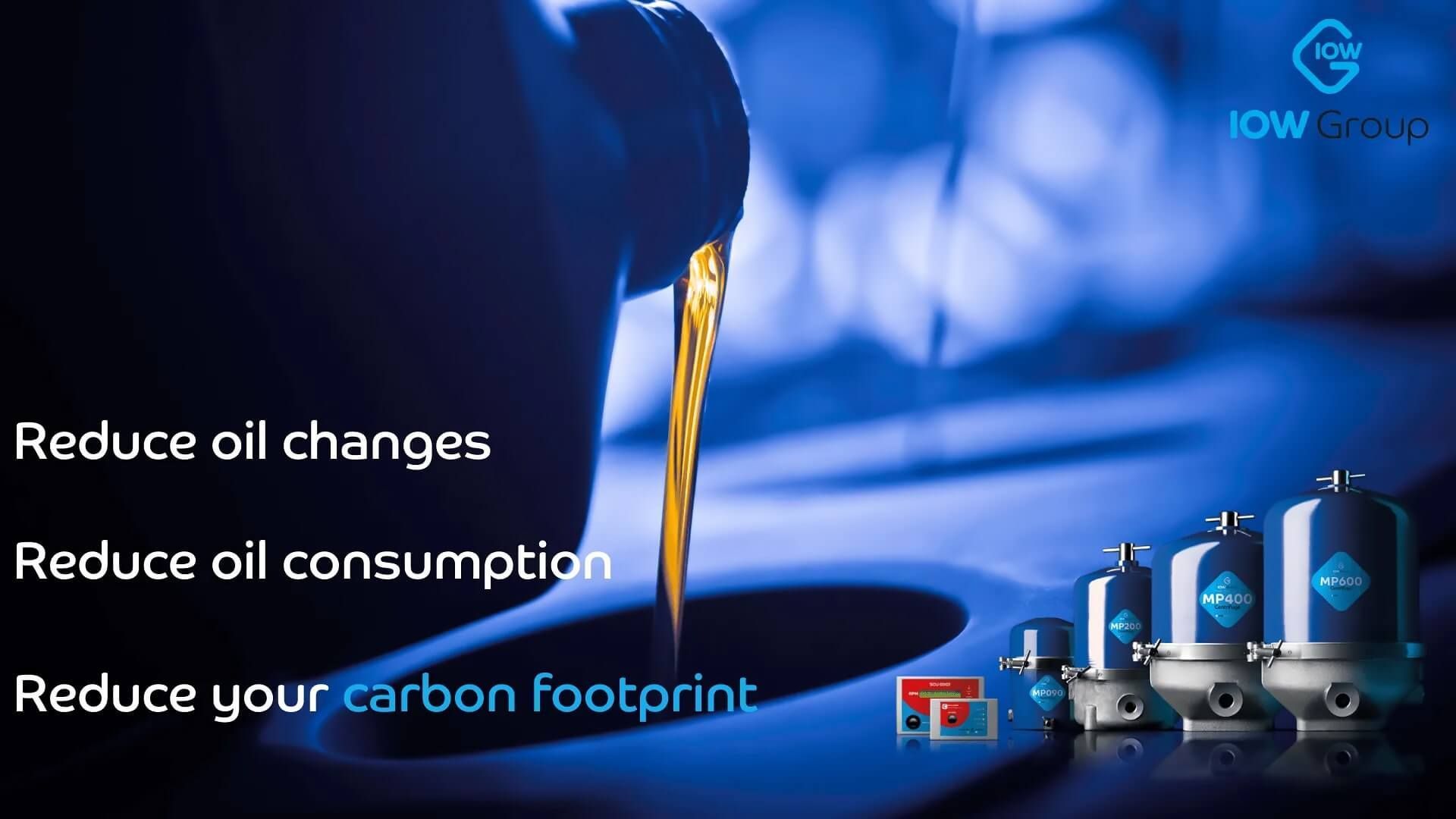
Installing an IOW centrifuge filter can help extend oil change intervals, reduce oil consumption and as a result reduce your carbon footprint
Extending Oil Change Intervals to Protect the Planet
Oil change intervals have evolved. More and more business owners view oil as a precious asset to be looked after instead of disposable. The impact oil can have on the environment when misused can be devastating, so industries are looking to reduce carbon emissions and extend oil life span to use it to its full potential! Luckily, improving your environmental credentials goes hand in hand with cost savings and conserving valuable resources that benefit the whole company.
The damage caused by harmful particles in oil can be very costly! The actual price of the oil is a small portion of the price you could pay without filtering out contaminants. The oil comes in various compositions and qualities, but even brand new oil contains contaminants that will cause damage to the engine. Particulate found in lube oil causes excessive wear, mechanical failures, and unexpected downtime. Without filtration, these problems will compile, eventually breaking down machinery. Just changing the oil is not enough. It is essential that effective filtration is in place to remove the soot, purify the oil and allow it to continue working to lubricate the engine.
Oil changes also require other resources such as machine downtime, man-hours taken to complete the change, safe disposal of the oil, admin costs, and paperwork, all add to the total cost of an oil change. It is estimated that an oil change costs 40 times the price of the actual oil, making it an uneconomical choice as well as unsustainable.
IOW centrifuge oil filters remove the maximum contaminants from your lubrication oil. Combining unique patent-protected features makes the IOW centrifuge filters 150% more efficient than any available centrifuge filter. We have helped customers worldwide extend the lifespan of their oil and extend oil change intervals to become more environmentally friendly. Read more about our installation results at the end of this article.
Both the ISO cleanliness code and the base number (TBN) are indicators of whether the oil needs changing. While extending oil change intervals is advisable to reduce your carbon footprint, additives and acids within machinery will eventually make the oil no longer fit for purpose. That’s why, as well as better filtration, regular testing and analysis of the oil is required. It also gives the opportunity to see the effectiveness of the IOW centrifuge filter. You will see oil quality improve and feel confident in the continued use of the oil.
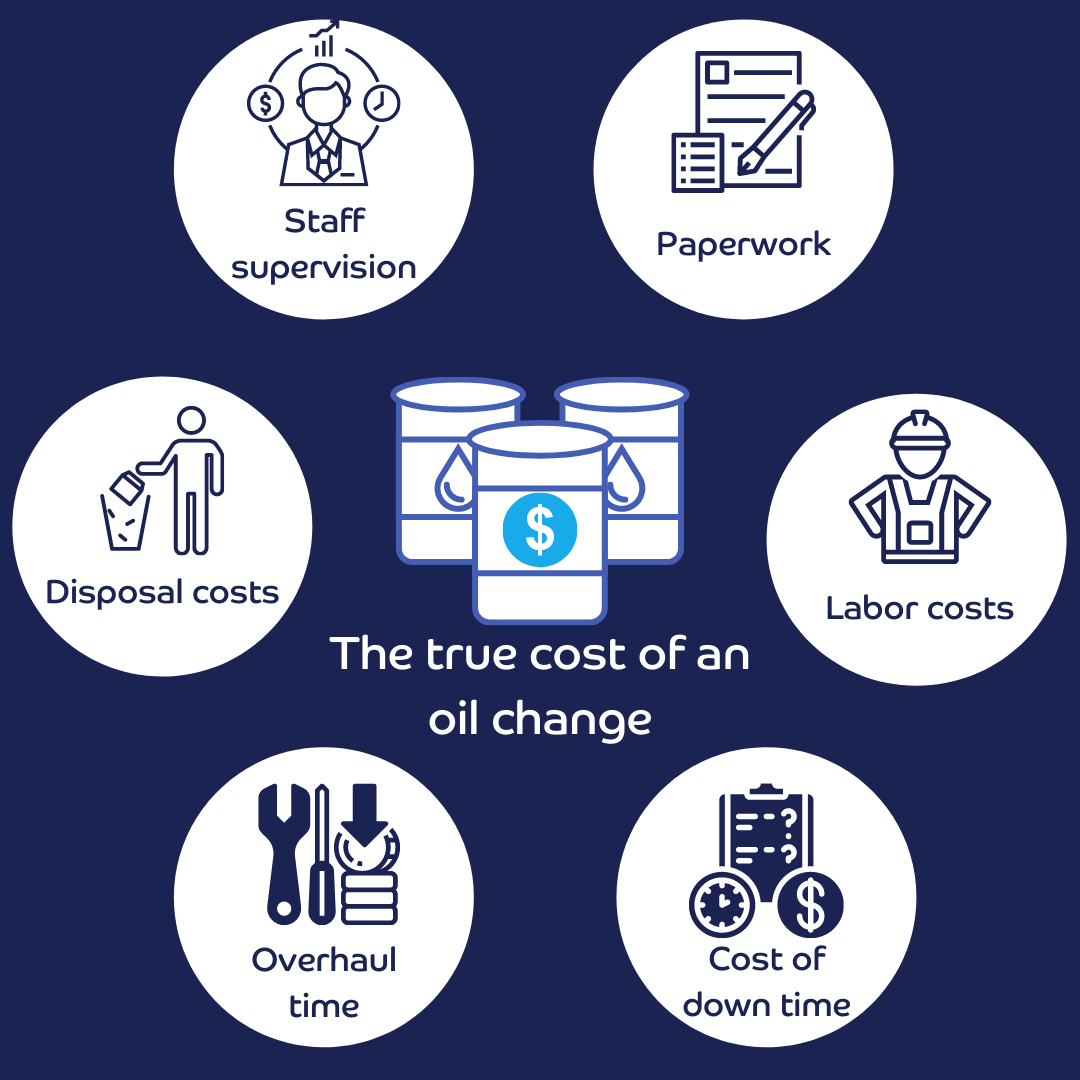
The cost of the oil is not the only expense to consider when an oil change is performed
Another environmental benefit of installing an IOW centrifuge filter is the extension of primary filter life. Primary filters quickly become blocked and are then ineffective at filtering oil. They do not have the capability to remove the smaller contaminants that cause the most damage in machinery which is why a bypass (or kidney loop) centrifugal filtration system is the most efficient option to protect your equipment. On one installation by installing an IOW centrifuge filter the primary filter life was extended from 500 hours to a fantastic 1500 hours! That’s 300% more life for each of the primary filter! In the long term this means less primary filters need purchasing, oil is better quality and lasts longer and fewer resources are used overall.
Disposable filters are not just poor at filtration, but they are also extremely damaging to the environment. Organizations will get rid of filters that are saturated with coolant, oils, metal shards and powder residue. The disposable filters are then sent to landfills containing a concoction of different chemical wastes that seep into the earth and damage the environment. IOW centrifuges assist greatly in the extension of disposable primary filters helping to further reduce your carbon footprint. Whilst disposable filters clutter landfills worldwide, IOW centrifuges are reusable and only a small paper insert needs replacing when serviced. Companies switching to permanent components are saving thousands on disposal costs, man-hours and resources.
It’s not just costs regarding the machinery that needs to be accounted for. For every new part that is ordered, there are many resources used before the part even arrives at its destination! Administration costs, customs costs, import taxes, transportation costs, bank charges, and even signing for a parcel are all used to deliver goods. Investing in an IOW filter extends oil change intervals, extends primary filter life, and as a result, reduces the costs and resources spent.
In conclusion, changing oil at set intervals has many hidden costs, causes unnecessary environmental damage, and uses huge amounts of company resources. It has been shown how extended oil change intervals can lead to enormous savings and is more sustainable than old practices. The ripple effect of changing to an IOW centrifugal oil filter is long-lasting and far-reaching through organizations to help create greener and more sustainable solutions within the filtration industry.
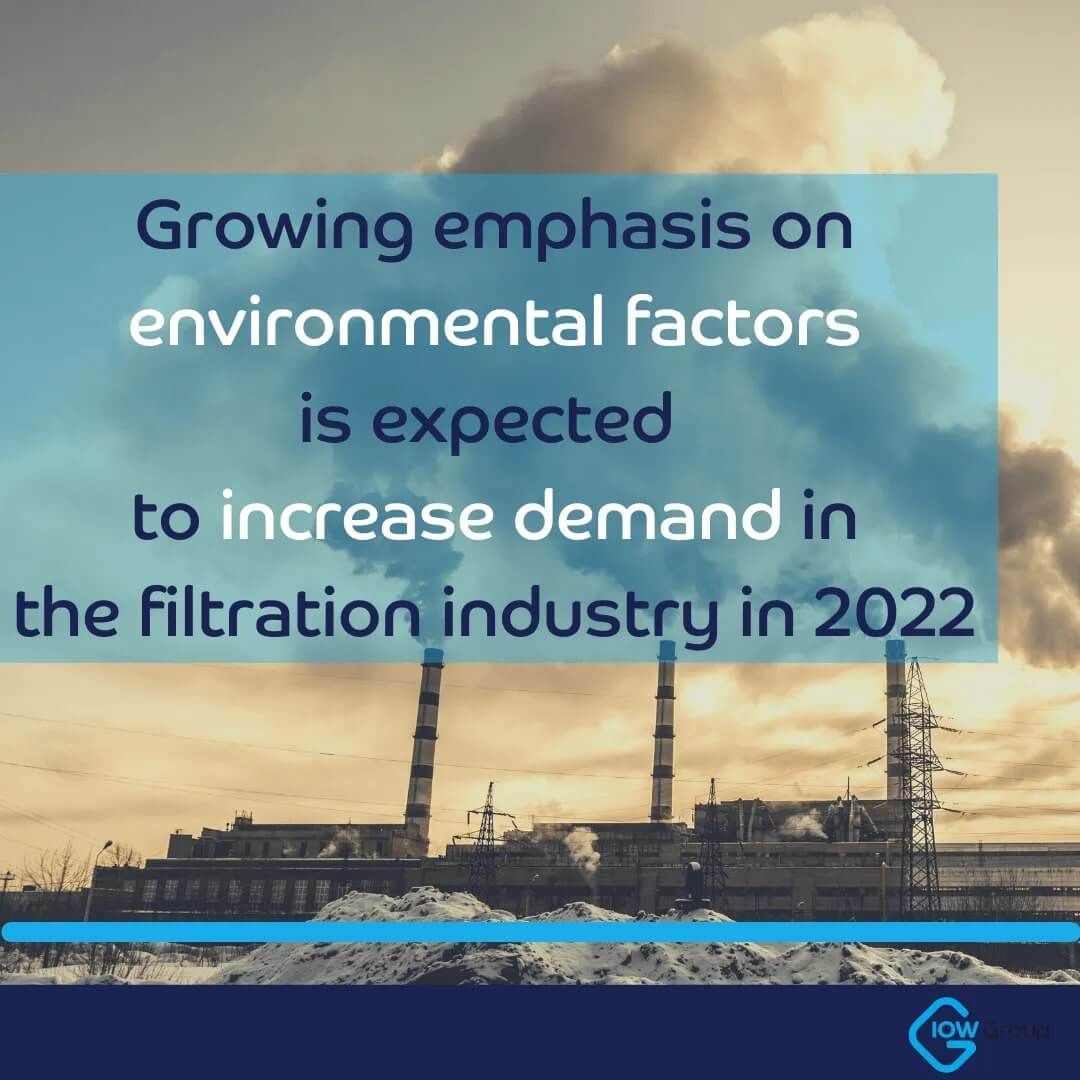
Organizations must become more sustainable if they are to survive increasingly stringent environmental regulations
Installation Results:
Industry: Oil & Gas- Pumping station
Engine Type: ALCO 18-251 (V18)
Oil Pressure: 78 PSI (5.3 Bar
Model Installed: IOW MP600 Centrifugal Oil Filter x 2
A pumping station wanted to improve operational performance on their ALCO 18-251 engine. Two (2) IOW MP600 centrifuge oil filters were retro-fitted to the existing pipework replacing two (2) outdated centrifugal oil cleaners. Once installed the centrifuges removed 65% more dirt than the previous filters and extended the lifespan of their primary filters from 500 to 1500 hours! This is a significant improvement for the customer who was very happy with the IOW centrifuges describing them as “excellent.” Further savings were made when it was found that reduced wear on O-Rings and liners increased the lifespan of critical engine components. Find out the full story of this installation here.
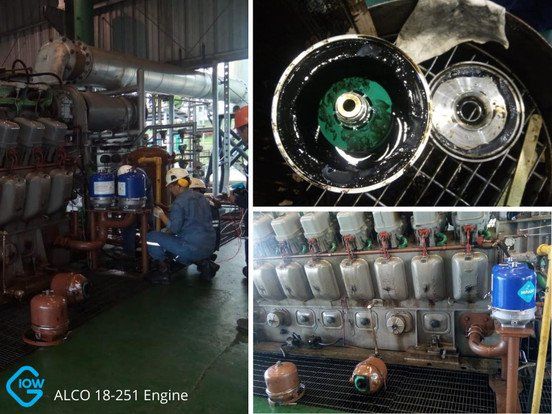
When installed on an ALCO 18-251 engine 65% more dirt was removed and primary filter life was extended by 300%
Industry: Power Generation- Power plant
Engine Type: Hyundai Himsen 9H21/32
Oil Pressure: 64 PSI (4.4 Bar)
Model Installed: IOW MP600 Centrifuge Oil Filter
A power plant in South America was interested in potential cost savings by using an IOW centrifuge filter on their Hyundai Himsen 9H21/32 engine. The centrifuge was retrofitted to replace an existing Mann+Hummel centrifugal oil cleaners. After 200 run-hours, the IOW MP600 centrifuge filter had removed 1730 grams of dirt at a rate of 8.7 grams per hour! Due to the reduced contaminants, oil change intervals more than doubled! Previously oil change was performed at 700 hours, but this was now extended to 1500 hours! The base number levels (TBN) also remained acceptable, with only a 10% reduction on new oil levels. Thanks to the information provided, we calculated cost savings for this one engine as per the table below. Following fantastic results, the customer wishes to install IOW MP600 centrifuge filters on all engines at the plant. Find the full details of this installation
here.

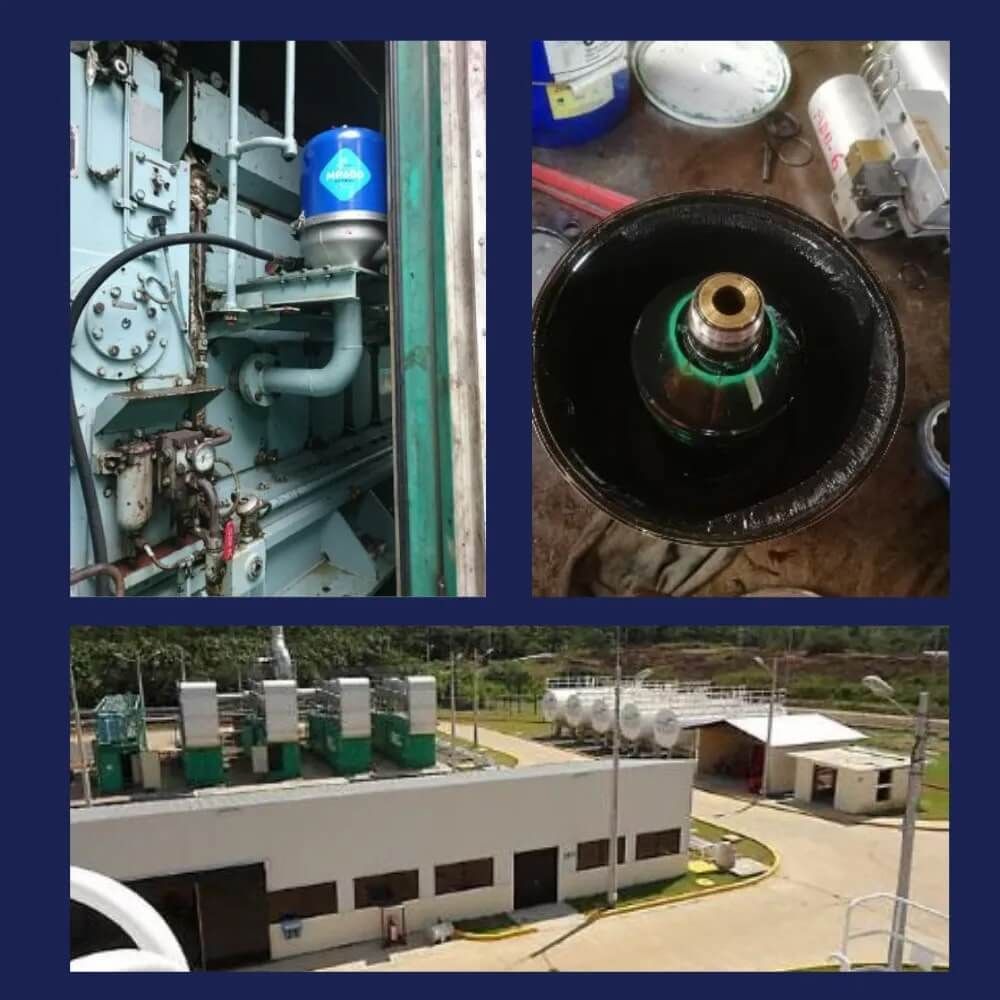
When installed on a Hyundai Himsen 9H21/32 oil change intervals were more than doubled making huge savings at this power plant
If you'd like more information regarding the IOW centrifuge filters then please fill in the contact form at the bottom of this page


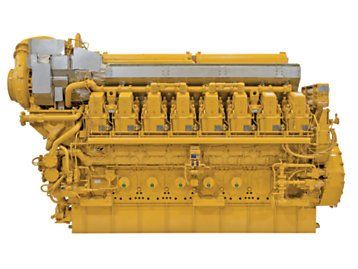
Contact the IOW Group
We will get back to you as soon as possible
Please try again later



